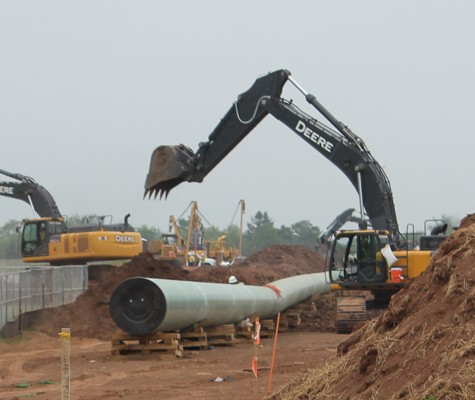
Proposed PennEast Pipeline Demonstrates Need for Change
WASHINGTON, DC — (February 5, 2020) Federal reforms are needed to prevent the agency in charge of reviewing pipeline applications from ignoring potential environmental damage, according to testimony from an opponent of the proposed PennEast pipeline at a hearing before a U.S. House subcommittee.
Environmental law expert Jennifer Danis, senior staff attorney at Columbia University Law School’s Environmental Law Clinic, criticized the Federal Energy Regulatory Commission (FERC) practice of approving pipelines before knowing what adverse impacts to state water quality and wetlands they would cause, and condoning land condemnations for projects whose need is based entirely on self-dealing contracts. Danis, who represents New Jersey Conservation Foundation and the Watershed Institute in their opposition to the PennEast pipeline, pointed to FERC’s flawed review of that project as a prime example of the need for change.
The hearing considered various provisions to modernize the federal Natural Gas Act as part of the recently proposed Climate Leadership and Environmental Action for our Nation’s (CLEAN) Future Act, which offers comprehensive solutions to address the climate crisis. The Act was introduced under the guidance of the House Energy and Commerce Committee, chaired by Rep. Frank Pallone (D-NJ).
The CLEAN Future Act includes several reforms aimed at modernizing U.S. energy markets, starting with FERC, including provisions that would require FERC to consider climate change as part of its review of pipeline applications, update natural gas eminent domain laws to better protect landowners, and make FERC’s proceedings more open to the public — including creating an Office of Public Participation and Advocacy.
“The Commission’s administration of the Gas Act fails to serve the public and contravenes the Act’s main goal of protecting the public against excessive corporate power,” Danis said. Although courts have slowly begun to address these issues, the CLEAN bill’s proposed reform of the statute will restore the Gas Act’s intent of protecting the public interest by only allowing condemnations to proceed for projects that the public actually needs, and which can be built without destroying water and air quality.”
Danis also took FERC to task for its view that federal law allows owners of the proposed pipeline to take New Jersey-owned land under eminent domain. “The PennEast Pipeline is just one example of the Commission allowing the use of eminent domain before the certificate-holder has demonstrated that the project is in the public interest and that the condemned lands are necessary for pipeline construction,” Danis said. “The situation is untenable and unlawful. And worse, the Commission granted PennEast a certificate that it used to commence eminent domain proceedings without any data about the public harms the project would cause to New Jersey water quality.”
A federal appeals court ruled against PennEast’s interpretation, and the pipeline company is appealing to the U.S. Supreme Court.
The Commission’s current administration of the federal Natural Gas Act “is inadequate to serve the public,” Danis said. She noted that FERC fails to protect the public interest by approving pipelines on the basis of affiliated entity contracts, not true need — and that the companies involved would merely switch from existing pipelines to PennEast rather than use the new pipeline to meet public demand that otherwise would be unfilled.
“In order to establish that a project is in the public interest, an applicant must first demonstrate a public need for the project, but the Commission has not required PennEast to do more than show local distribution company affiliate contracts for the project in order to ostensibly satisfy this requirement,” Danis said in her prepared testimony.
“The Commission’s actions demonstrate that it is behaving as a captured agency, beholden to the interests of private corporations rather than the public interest it was created to protect,” Danis said. “The proposed Congressional amendments… can realign Commission practice to protect the public from excessive corporate power.”